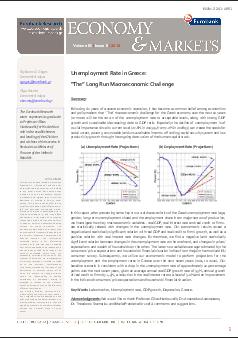Gogos, S. & Kosma, O. (2014) “Unemployment Rate in Greece: “The” Long Run Macroeconomic Challenge“, Eurobank Research Team, Economy and Markets, Vol. IX, Issue 6, June. Following six years of a severe economic recession, it has become a common belief among economists and policymakers that “The” macroeconomic challenge for the Greek economy over the next 10 years (or more) will be the return of the unemployment rate to acceptable …Read More
DG ECFIN And The Missing Greek Exports
Janssen, Ρ. (2014) “DG ECFIN And The Missing Greek Exports“, Social Europe Journal, 02 July. Economists at DG ECFIN are starting to notice something we have pointed out already some time ago: Despite an enormous cut in wage costs, Greek exports have firmly stayed put in recessionary territory and hopes for an export-led recovery have proven to be illusive. Troubled by this failure of Greek exports to lift off, DG …Read More
Greece Taps The Market
Horne, J. P. (2014) “Greece Taps The Market“, The European Institute. The Greek government borrowed on the international bond market last week, the first time in over four years.[1] The bond issue comes just five years after Greece’s severe economic and financial crisis had become an existential threat to the euro itself. The fact that Greece was able to borrow €3 billion for five years at 4.75%, with orders …Read More
Is Deflation a Risk for Greece?
Anastasatos, T. & Stamatiou, T. (2014) “Is Deflation a Risk for Greece?, Economy and Markets, Eurobank Research, Vol. IX, Issue 3, April. Deflation is the occurrence of negative inflation, i.e. the situation in which prices of goods and services are falling in an economy. By contrast, disinflation is a slow-down in the inflation rate. In technical terms, deflation is considered to have occurred when CPI or the GDP deflator …Read More
The Greek Crisis: Origins and Implications
Galenianos, M. (2014) “The Greek Crisis: Origins and Implications“, Greek Economists for Reform.com, 07 April. This paper argues that the deep causes of the Greek and Eurozone crisis are the large external imbalances (trade deficits) of the countries of the European periphery. Their fiscal imbalances exacerbated but did not cause the crisis and therefore fiscal adjustment is a necessary but not sufficient condition for economic recovery. For their economies …Read More
Implementation of the Macroeconomic Adjustment Programmes in the Euro Area: State-of-Play
Gros, D., Alcidi, C., Belke, A. Coutinho, L. & Giovannini, A. (2014) “Implementation of the Macroeconomic Adjustment Programmes in the Euro Area: State-of-Play“, Economic Policy, CEPS Paperbacks, 11 March. Two of the four macroeconomic adjustment programmes – in Portugal and Ireland – can be considered a success in the sense that the initial expectations in terms of adjustment, both fiscal and external, were broadly fulfilled. A rebound based on …Read More
Latvia and Greece: Less is More
Biggs, M. & Mayer, T. (2014) “Latvia and Greece: Less is More“, Economic Policy, CEPS High-Briefs, 12 February 2014 Key Points: Despite considerable differences, there were also many similarities in economic performance between Latvia and Greece before their respective adjustment crises. After the immediate crisis, however, economic activity rebounded sharply in Latvia but continued to contract in Greece. This paper argues that this difference was due primarily to developments in …Read More
The Euro at Age 15 — Is it a Reserve Currency Yet?
Horne, P. (2014) “The Euro at Age 15 – Is it a Reserve Currency Yet?”, The European Institute, February 2014. The euro was welcomed at birth on Jan. 1, 1999, as a new financial currency (coins and banknotes were issued three years later) and hoped by its promoters to be an alternative to the dollar, which had reigned as the world’s primary reserve currency since the 1944 Bretton Woods agreement. …Read More
Greece in Crisis: Austerity, Populism and the Politics of Blame. JCMS: Journal of Common Market Studies
Vasilopoulou, S., Halikiopoulou, D. and Exadaktylos, T. (2014), “Greece in Crisis: Austerity, Populism and the Politics of Blame. JCMS: Journal of Common Market Studies”, 52: 388–402. Within the broader debate on the Greek crisis, the theory of ‘populist democracy’ postulates that populism is fundamental to the sustenance of the Greek political system and is at the heart of Greece’s endemic domestic weaknesses. This article tests this assumption empirically through the …Read More
Attracting top research and innovation performers as the way forward to exit the Greek crisis
Kritikos, A. and Cartalos, O., (2013), “Attracting top research and innovation performers as the way forward to exit the Greek crisis”, Greek Economists for Reform Blog, Working Paper, December. M. Haliassos writes: Alexander Kritikos and Odysseas Kartalos argue forcefully that, for Greece, the way out of the current economic crisis is not austerity but a long-term plan focusing on innovative industries with high added value. However, in comparison to other …Read More





